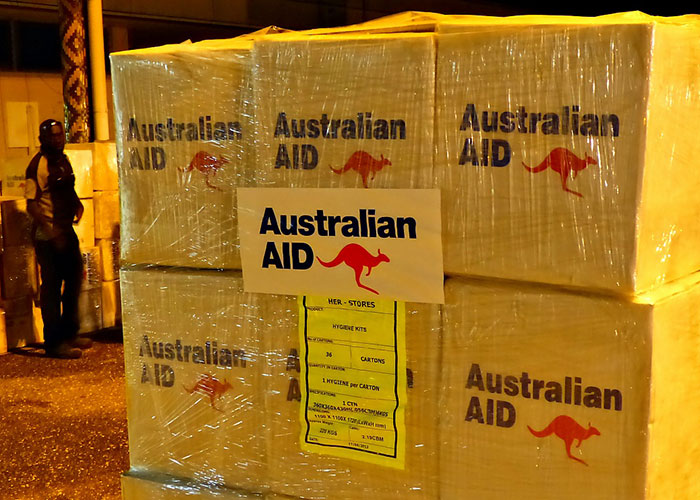Browse our range of reports and publications including performance and financial statement audit reports, assurance review reports, information reports and annual reports.
The audit objective was to assess the effectiveness of the Department of Defence’s arrangements to manage the security authorisation of its ICT systems.
Please direct enquiries through our contact page.
The audit sought to assess the efficiency and effectiveness of the ADF's management of fuel and lubricants and to identify possible areas for improvement. The audit focused on major aspects of the fuel supply chain, in particular the strategic management of fuel (eg. the coordination of fuel requirements and stockholding policy). The audit also reviewed fuel procurement practices, storage and handling issues. The audit coverage addressed the fuel supply aspects of these matters rather than transport, distribution and equipment issues. Although directed principally towards operational fuels, the audit took into consideration issues associated with ADF's requirement for oils and lubricants.
ANAO found that the actions taken by the Department during the course of the audit to update and improve the Notes on Administration and administrative processes, by commissioning various specialist studies and reviewing governance issues, has established a sound basis for ongoing effective management of the National Highway System. The Department advised ANAO that changes to the Notes on Administration reflect joint work done with the ANAO to identify where improvements could be made and incorporate not only suggestions and recommendations that the ANAO has made in the final report but also during the audit. ANAO considers that the comprehensive revision of the Notes on Administration undertaken by the Department should foster marked improvements in the management of the National Highway System.
The audit is a follow-up of ANAO Audit Report No.33 of 1997-98, which assessed the effectiveness and efficiency of the Commonwealth's management of the Great Barrier Reef and made seven recommendations for improvement. The objective of the follow-up audit was to assess the extent to which the Great Barrier Reef Marine Park Authority, which is responsible for advising the Commonwealth on the care and developement of the Marine Park, has implemented the recommendations of the earlier audit.
The objective of this audit was to assess the effectiveness of Army’s workforce planning.
Please direct enquiries relating to reports through our contact page.
In 2005, a 12-year $106 million contract was entered into by the Australian Government for helicopter response, surveillance and logistics support missions to prevent people smuggling and manage other maritime threats across the North West approaches of Australia. The term of the contract is due to expire in 2024 at an estimated total cost of $182 million. The Department of Home Affairs’ Annual Procurement Plan includes conducting a procurement in 2023—24 to replace this contract.
As set out in Auditor-General Report No. 6 2021–22, Management of the Civil Maritime Surveillance Services Contract the rotary wing contract is the second and smaller of two contracts the department has in place for aerial surveillance. The procurement process for, and management of, the rotary wing services contract was not examined in Auditor-General Report No. 6 of 2021–22 Management of the Civil Maritime Surveillance Contract. The conduct of the procurement of a new contract for rotary wing surveillance, response and logistic support services will provide an early indication of whether lessons have been learned from the management of the civil maritime surveillance services contract examined in that Auditor-General Report. The Joint Committee of Public Accounts and Audit has recommended that the ANAO undertake a performance audit of the Department of Home Affairs’ transition to the new surveillance services contract when the current contract expires (in 2027).
The audit would assess whether the conduct of the procurement employed open and effective competition and achieved value for money, consistent with the Commonwealth Procurement Rules (CPRs).
Please direct enquiries through our contact page.
Mr P.J. Barrett (AM) - Auditor-General for Australia, address to the ACT Chapter of the Australasian Institute of Risk Management
The objective of the audit was to determine whether DEST has effective governance practices for its IT and e- Business; has adequate systems in place to measure the efficiency and effectiveness of its IT and e-Business; implements and maintains appropriate quality standards within its IT and e-Business systems; and implements proper controls, including risk management, to achieve maximum benefits from its IT and e- Business. The audit examined education and training services provided, or managed, by DEST via IT or the Internet.
The audit objective was to assess the effectiveness of the Department of Immigration and Border Protection in delivering high quality interpreting services to its clients.
Please direct enquiries relating to reports through our contact page.
This audit considered the action taken in relation to the recommendations of Audit Report No.47, 1991-92, Energy Management of Commonwealth Buildings. The objective of this follow-up audit was to assess whether the Department of Primary Industries and Energy, the Department of Administrative Services, and the Department of Finance had taken appropriate action in relation to the recommendations. The audit criteria were the extent to which the original recommendations agreed by the agencies had been implemented and what had been achieved.
The objective of this audit was to assess the extent to which the Department of Agriculture and Water Resources (Agriculture) has addressed the recommendations from ANAO Audit Report No. 46 of 2011–12, Administration of the Northern Australia Quarantine Strategy (NAQS).
Please direct enquiries through our contact page.
Mr P.J. Barrett (AM) - Auditor-General for Australia, presented at a Seminar on 'Financial Management and Electronic Government' Kuala Lumpur
The audit reviewed the Defence Materiel Organisation's management of the $3.43 billion Wedgetail Airborne Early Warning and Control (AEW&C) project. The Wedgetail project is to provide the Australian Defence Force with an AEW&C capability based on four Boeing 737 AEW&C aircraft and associated supplies and logistic support. At the time of the audit the AEW&C systems were still in their early development phase, and by November 2003, Defence had spent $1.107 billion on the project.
The audit reviewed the management and recording of guarentees, warranties, indemnities and letters of comfort issued by the Commonwealth and also assessed action taken in the relation to the recommendations from ANAO Audit Report No. 47 1997-98. The objectives of the audit were to assess the extent of:
- improvement in agencies' management and monitoring of the Commonwealth's exposure to these instruments;
- changes in the size and nature of the exposure since 30 June 1997; and
- the approach of agencies to effective risk management and control of Commonwealth exposures to these instruments.
The objective of the audit was to examine the effectiveness of the design and implementation of the clear read principle under the Commonwealth Resource Management Framework.
Please direct enquiries through our contact page.
- Management and the Board constantly monitor the control framework to support and enhance the commercial basis of operations and ensure the performance and profitability of the entity. Other corporate Commonwealth entities could benefit from applying a similar governance and cultural framework to their operations and service delivery activities.
In January 2000, the ANAO published a Better Practice Guide (BPG) Business Continuity Management, Keeping the wheels in motion (the Guide). The Guide established that the objective of Business Continuity Management (BCM) is to ensure the uninterrupted availability of all key business resources required to support essential (or critical) business activities. This is achieved by organisations building resilience (controls and redundancy) into business operations to prevent, or minimise, the likelihood of business continuity risks occuring and, also, developing plans that minimise the impact should they occur. The primary objective of this audit was to examine BCM arrangements across four Commonwealth organisations, to assess whether their existing BCM frameworks ( or frameworks under development) exhibit the principles espoused in the Guide. At the Commonwealth - wide level, the ANAO considered the continuing relevance of the principles presented in the Guide.
The audit objective was to examine whether Health's financial management framework and processes adequately support Health's Secretary, Executive and managers to make informed decisions on the use of Commonwealth resources.
The primary objectives of the ANAO preliminary study were to gain an understanding of the concepts and associated processes used in the management of preparedness. This included the methodology for translating the Government's strategic guidance into military capability; the processes by which the Services translate preparedness directives into operational requirements; and how Headquarters ADF (HQADF) and the three Service Offices assure themselves that units can satisfy the requirements of preparedness directives.
Within the scope of this preliminary study the ANAO did not attempt to form a conclusion regarding the current ability of the ADF to satisfy the roles set by Government in strategic guidance; that is, its actual state of preparedness. It was important first to obtain a good understanding of the concepts and associated methodology used by Defence in managing preparedness.
The ANAO Corporate Plan 2018–19 is the ANAO's key strategic planning document. It guides our operating environment and sets out how we will deliver on our purpose. The corporate plan is complemented by the annual audit work program which reflects the ANAO's audit strategy and deliverables for the coming year.
Please direct enquiries about our corporate plan through our contact page.
The next Financial and Performance Reporting Forum is scheduled for Friday, 27 June 2025. Further information about the forum will be announced closer to the event date. If you have any questions regarding the upcoming forum, please contact External.Relations@anao.gov.au.
For any enquiries, please contact External.Relations@anao.gov.au
The objective of the audit was to assess the Moorebank Intermodal Company’s achievement of value for money and management of probity in its operations and procurement activities.
Please direct enquiries through our contact page.
The audit objective was to assess the effectiveness of the Department of the Environment and Energy’s design of the Threatened Species Prospectus.
Please direct enquiries through our contact page.
- Financial statements audit recommendations can relate to performance issues. The approach identified in this audit highlighted the importance of involving the relevant business area within the entity and monitoring these recommendations through the Audit and Risk Committee.
The audit objective was to assess how effectively the selected public sector entities manage risk.
Please direct enquiries relating to reports through our contact page.
The objective of the audit was to assess the Department of Human Services' and the Department of Social Services’ management of selected fraud prevention and compliance Budget measures.
Please direct enquiries relating to reports through our contact page.
The objectives of this audit were to assess, with respect to guarantees, indemnities and letters of comfort:
- changes in the size and nature of the Commonwealth's reported exposure since 30 June 1995;
- the extent of improvement in agencies' management and monitoring of the Commonwealth's exposure to these instruments;
- the approach of agencies to effective risk management and control of Commonwealth exposures to these instruments; and
- whether current reporting practices provide a sufficiently comprehensive coverage for public accountability purposes, at both the agency and whole of government levels.
Industry levies play a significant role in the provision of many public services and fund a range of activities undertaken by regulatory bodies such as the Australian Prudential Regulation Authority (APRA), through to financing reform of the Australian waterfront labour force. The objectives of this audit were to assess:
- the coverage, revenue and expenses of non-primary industry levies;
- the effectiveness of selected entities' financial management of non-primary industry levies; and
- areas of better administrative practice relating to the financial management of non-primary industry levies.
The objective of the audit was to assess the effectiveness of DIAC’s management of the student visa program. Three key areas were examined in the audit: the processing of student visa applications; ensuring compliance with student visa conditions; and cooperation between DIAC and DEEWR.
The objective of the audit was to assess how well EMA is meeting its objective of providing national leadership in the development of measures to reduce risk to communities and manage the consequences of disasters.
The audit objective was to assess the effectiveness of physical security arrangements in selected Australian Government agencies, including whether applicable Australian Government requirements are being met.
Please direct enquiries relating to reports through our contact page.
The audit objective was to assess whether Services Australia appropriately managed risks to operating the current welfare payment system and appropriately prepared to transition to the future system.
Please direct enquiries through our contact page.
The objective of the audit was to assess the effectiveness of Customs and Border Protection’s arrangements for managing the safe and secure storage and disposal of detained goods.
The objective of the audit was to assess the effectiveness of the Department of Foreign Affairs and Trade’s management of Australian aid to Vanuatu.
Please direct enquiries relating to reports through our contact page.
The objective of this audit was to examine whether value for money is being delivered by the Australian Rail Track Corporation’s (ARTC’s) management of the Inland Rail pre‑construction program.
Please direct enquiries relating to reports through our contact page.
The purpose of the audit was to assess the effectiveness of Sport Integrity Australia’s management of the National Anti-doping Scheme.
Please direct enquiries through our contact page.
The objective of the audit was to assess whether selected Commonwealth organisations had utilised better practice principles when establishing the role, and managing the use of their internal audit groups. In order to evaluate internal audit, the Australian National Audit Office (ANAO) first considered the status and accountabilities of internal audit within the overall governance framework of the organisations audited, in particular its accountabilities to the audit committee.
The audit objective was to assess the effectiveness of the Department of Health’s records management arrangements, including Health’s progress in transitioning to digital records management.
Please direct enquiries relating to reports through our contact page.
The Auditor-General responded on 25 May 2020 to correspondence from Senator Katy Gallagher dated 4 May 2020, requesting that the Auditor-General conduct an investigation to examine the effectiveness of the Commonwealth Government’s debt management given the significant and rapidly increasing Commonwealth government debt levels as a result of the COVID-19 pandemic. The Auditor-General provided a follow-up response to Senator Gallagher on 24 July 2020.
Please direct enquiries relating to requests for audit through our contact page.
The objective of this audit was to assess whether selected organisations had effective security risk management programs, including whether a selection of protective security risk treatment controls was working as designed.
The objective of the audit was to assess the effectiveness of the Australian Competition and Consumer Commission in managing compliance with fair trading obligations.
Please direct enquiries relating to reports through our contact page.
- Good record keeping is required by law and supports effective corporate governance, accountability and performance.
Mr P.J. Barrett (AM) - Auditor-General for Australia, presented at the 25th National Conference of Association of Risk and Insurance Managers of Australasia Limited
The goal of the $250 million Emerging Markets Impact Investment Fund (EMIIF) is to help address access to finance challenges for small and medium-sized enterprises (SMEs) in South and South East Asia. It invests in funds and other financial intermediaries that in turn invest in early and growth stage SMEs with investments in the range of USD5,000 to USD2 million. The May 2023–24 Federal Budget measure that increased the size of the EMIIF stated that the majority of assistance would be provided via equity and loans (rather than grants), the cost of which will be met from Australia’s existing Official Development Assistance (ODA) funding.
EMIIF is an investment trust with DFAT as the sole beneficiary. Day to day management is undertaken by the investment manager appointed by DFAT and investment decision making is undertaken by the investment committee appointed by DFAT, as well as representatives from the investment manager. The design of EMIIF was intended to enable appropriate DFAT oversight by a DFAT delegate for the EMIIF being responsible for making any contractual and strategic decisions, who would be advised by an SES-level Impact Investing Advisory Group to provide advice, guidance and support regarding the overall direction and implementation of EMIIF and DFAT’s other impact investing programs. In addition, a Secretariat within DFAT is responsible for the day-to-day management of EMIIF, including interaction with counterparties to monitor ongoing performance, disseminate information and prepare relevant reporting to the advisory group or decision-makers.
The audit would examine DFAT’s establishment and oversight of the EMIIF.
Please direct enquiries through our contact page.
The Auditor-General received correspondence from Senator the Hon Don Farrell dated 7 November 2022, requesting that the Auditor-General conduct an investigation to examine the Parliamentary Expenses Management System project.
The Auditor-General met with Senator the Hon Don Farrell on 24 November 2022 to discuss the concerns raised in the request for audit. The request is being considered in the development of the ANAO 2022–23 Annual Audit Work Program.
The Auditor-General provided a follow-up response to Senator the Hon Don Farrell on 14 April 2023.
Please direct enquiries relating to requests for audit through our contact page.
The objective of the audit was to assess the effectiveness of the Department of Foreign Affairs and Trade’s overseas crisis management and response arrangements in meeting the government’s objectives for returning Australians from overseas in response to the COVID-19 global pandemic.
Please direct enquiries through our contact page.
The corporate plan is the ANAO’s primary planning document. Our strategic planning process allows us to continually improve practices and capabilities to demonstrate value in the delivery of services to the Parliament. The corporate plan is complemented by the annual audit work program, which reflects the ANAO’s audit strategy for the coming year.
Please direct enquiries about our corporate plan through our contact page.
The audit reviewed Australian Development Scholarships (ADS). ADS's are the principal mechanism by which Australia provides scholarship assistance for individuals from developing countries to undertake studies at Australian education institutions. The scholarships help to meet the human resource development needs of developing countries and contribute to their development across various sectors. Scholarships also have an important role in fostering and sustaining Australia's relations with developing countries, particularly in the Asia-Pacific region. The objective of the audit was to evaluate AusAID's management of the ADS scheme.
The audit objective was to assess the effectiveness of the management of the Australian Public Service (APS) workforce in implementing the Australian Government’s COVID-19 priorities.
Please direct enquiries through our contact page.
Mr P.J. Barrett (AM) - Auditor-General for Australia, presented at the Risk Management in the Public Sector Seminar
- A strategy assists with assessing effectiveness in achieving objectives by establishing clear and measurable performance expectations, identifying the information to be collected for assessment and evaluation purposes, and establishing a framework for progress reporting and evaluation against the documented expectations.
The objective of this audit was to assess the effectiveness of the ANAO’s internal budgeting and forecasting processes and practices. View the audit.
This page lists status updates about the ANAO's progress on recommendations contained in the audit.
Please direct enquiries through our contact page.
The audit examined the ATO's management of its relationship with tax practitioners (tax agents and the wider group of professionals working on taxation matters for clients). However, our main focus was the ATO's management of its relationship with tax agents because they are the core element of the tax practitioner grouping and their role is fundamental to the effective operation of the tax system. The objective of the audit was to assess how well the ATO manages its relationship with tax practitioners, focussing on selected ATO relationships with tax practitioners, in particular its regulatory relationship with tax agents, its service support relationship with tax agents and its relationship with tax agents and members of the wider tax practitioner group in the professional bodies as key stakeholders in tax administration.
The objective of the audit was to assess whether Defence Housing Australia administers its functions efficiently and effectively, and in accordance with the Government Business Enterprise guidelines.
Please direct enquiries through our contact page.
The objective of this audit was to examine the effectiveness of the Department of Home Affairs’ management of its public communications and media activities.
Please direct enquiries through our contact page.
This audit would examine the Department of Social Services’ (the department’s) design and implementation of performance measures and evaluation planning for the National Plan to End Violence against Women and Children 2022–2032 (National Plan).
The National Plan was launched in October 2022 and sets the national policy agenda for addressing violence against women and children in Australia for the next 10 years. The Australian Government has committed $2.23 billion over six years (2022–23 to 2027–28) to deliver the outcomes of the National Plan and related women’s safety initiatives. Two actions plans, outlining actions for Commonwealth, state and territory governments, have been developed to support the implementation of the National Plan: the First Action Plan 2023–2027; and the Aboriginal and Torres Strait Islander Action Plan. The National Plan is also supported by the Outcomes Framework 2023–2032 which links actions outlined in the action plans to outcomes. The department has primary responsibility for the National Plan, including policy development and program and service design. The Domestic, Family and Sexual Violence Commission is responsible for ensuring activities and initiatives by governments are appropriately aligned and collaborative, and for providing annual reports to Parliament on progress against the National Plan.
Please direct enquiries through our contact page.
The audit reviewed Commonwealth National Parks involving total assets of $105 million with net operating costs of $41.77 million. Nineteen Commonwealth reserves are declared comprising six terrestrial national parks, one botanic garden and twelve marine parks and reserves totalling some 23 million hectares across Australia, its external territories and Commonwealth marine areas. The objective of the audit was to examine and report on the adequacy of the planning, management and reporting systems which support the Director of National Parks in the achievement of required functions under relevant legislation and agreed outputs and outcomes.
The audit objective was to assess how well agencies manage their websites. Particular attention was given to the audited agencies' website purposes, risk management and planning, policies, content management procedures, and performance monitoring and reporting. These elements provide the framework for the design, implementation and operation of websites.
The audit follows on from Audit Report No. 45 2004-2005, Management of Selected Defence Systems Program Offices, May 2005. That report is being considered by the JCPAA, as part of its current inquiry into Defence Financial Management and Equipment Acquisition at the Department of Defence and DMO.
The audit objective was to assess the effectiveness of the management of international travel restrictions during the COVID-19 pandemic.
Please direct enquiries through our contact page.























